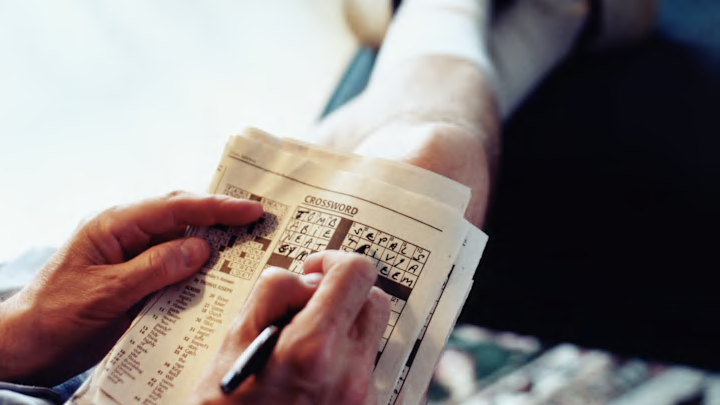For some people, the crossword puzzle is a relaxing way to start the day. For others, it’s an obsession. If you want to raise your crossword game to the next level, follow these tips for success.
- Pay attention to the day of the week.
- Punctuation can tip you off.
- Jump around.
- Grammar matters.
- Crossings are your allies.
- Mistakes are part of the game.
- Stick with the same source.
- Keep common words in mind.
Pay attention to the day of the week.
When it comes to conquering the crossword, timing matters. Many newspapers vary the type of puzzles they publish throughout the week. Thursday’s edition, for example, tends to have a theme linking all the answers together. The difficulty of the clues changes as well, with the challenges getting harder as the week progresses. If you only do the crossword on Saturdays, you may be setting yourself up for a headache. Start with Monday’s puzzle and ease yourself into the trickier brainteasers that come later in the week.
Punctuation can tip you off.

Crossword prompts follow certain formulas, and learning to recognize them will give you an edge in the game. Clues that end in a question mark are almost always hinting at some kind of wordplay. Seeing “cabinetmaker?” on its own may leave you stumped, but if you know the question has a double meaning, and the answer has nine letters, your deductions may lead you to the word president.
Jump around.
There’s no rule stating you have to start a crossword puzzle at 1-across. Instead, scan the page and find the easiest words to fill in first. Some clue formats tend to be more forgiving than others. Fill-in-the-blank prompts, such as “The Good, The Bad, and The ___,” are what crossword editors call “gimmes.” Shorter words are usually easy to solve as well. Compass directions (NNE, SSW, etc.) are a standard three-letter answer in crossword puzzles, so if you see a prompt like “Chicago-to-Boston direction,” you know the solution is one of eight possibilities.
Grammar matters.
Keeping basic grammar conventions in mind is an easy way to boost your crossword skills. If you’re at a total loss for an answer, take a closer look at how the clue is phrased. If it’s written in past tense, that means the solution is in the past tense as well—and you can begin brainstorming words that end in -ed. This also applies to clues that are plural. Knowing that a word ends in s isn’t enough to solve a puzzle, but it’s a good place to start.
Crossings are your allies.
If a crossword clue leaves you baffled, don’t lose hope. Solving the words that intersect with it could give you enough letters to make an educated guess. You can also use the crossings to check your work as you go. If your down words spell out gibberish in one of your across answers, you likely made a mistake somewhere along the way.
Mistakes are part of the game.

The boxes in a crossword puzzle are meant to be filled in, cleared out, and filled in again. Changing your guesses as you go is expected in a game where the solutions become clearer the more you play. That’s why most crossword apps give users a delete option. And if you’re filling out the print crossword puzzle longhand, you don’t get extra points for using ink instead of pencil.
Stick with the same source.
The tips above can be applied to most popular crossword puzzles, but the only way to know the quirks of your preferred outlet is through practice. Different editors may have specific clue formats—or even subject matters—they return to often. By picking one publication to commit to at the start of your crossword career, you can learn to recognize these patterns when they arise.
Keep common words in mind.
When you’re totally stuck, try plugging some common crossword terms into the blank squares of your puzzle. Short (three-to-four letter) words packed with vowels are often used to string longer answers together. So if you can’t decipher a clue, words like ERA, AREA, and EMU make pretty good guesses. If you suspect the word is a proper noun, SOHO, OHIO, and YOKO ONO are all popular crossword answers.
Learn More About Crossword Puzzles:
